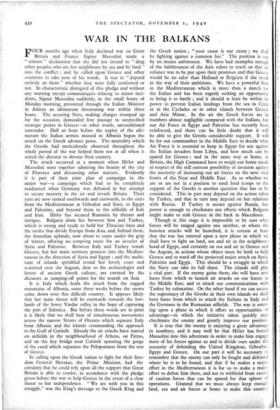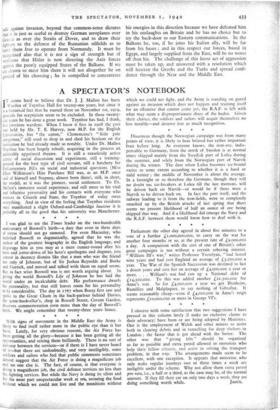WAR IN THE BALKANS ,
FOUR months ago when Italy declared war on Great 1: Britain and France Signor Mussolini made a " solemn " declaration that she did not intend to " drag other peoples who are her neighbours by sea and by land " into the conflict ; and he called upon Greece and other countries to take note of his words. It was to "-depend entirely on them " whether they were fully confirmed or not. In characteristic disregard of this pledge and without any warning except communiqués relating to minor inci- dents, Signor Mussolini suddenly, in the small hours of Monday morning, presented through the Italian Minister in Athens an ultimatum threatening war within three hours. The accusing Note, making charges trumped up for the occasion, demanded free passage to unspecified strategic points in Greece—in other words, unconditional surrender. Half an hour before the expiry of the ulti- matum the Italian armies massed in Albania began the attack on the Greek advance posts. The neutrality which the Greeks had meticulously observed throughout the whole period of the war helped them not at all when it suited the dictator to devour their country.
The attack occurred at a moment when Hitler and Mussolini were together admiring the beauty of the city of Florence and discussing other matters. Evidently it is part of their joint plan of campaign in the major war—a campaign which had to be completely readjusted when Germany was defeated in her attempt to secure mastery in the air and invade Britain. Their eyes are now turned southwards and eastwards, to the exits from the Mediterranean at Gibraltar and Suez, to Egypt and Palestine, and beyond them to the oilfields of Irak and Iran. Hitler has secured Rumania by threats and intrigue. Bulgaria alone lies between him and Turkey, which is strong and ready to hold her Thracian lines and the straits that divide Europe from Asia, and, behind them, the Anatolian uplands, now about to come under the grip of winter, offering no tempting route for an invader of Syria and Palestine. Between Italy and Turkey stands Greece, but her main territory projects into the Mediter- ranean in the direction of Syria and Egypt ; and the multi- tude of inlands sprinkled round her lovely coast and scattered over the Aegean, dear to the archaeologist and lovers of ancient Greek culture, are coveted by the dictators as jumping-off points for the assault on Asia.
It is Italy which leads the attack from the rugged mountains of Albania, some three weeks before the snows come down over this difficult country. It appears likely that her main thrust will be eastwards towards the low- lands of the lower Vardar valley in the hope of capturing the port of Salonica. But before these words are in print it is likely that we shall hear of simultaneous movements across the narrow Straits of Otranto which separate Italy from Albania and the islands commanding the approach to the Gulf of Corinth. Already the air attacks have started on airfields in the neighbourhood of Athens, on Patras, and on the key bridge near Corinth spanning the gorge of the canal which separates the Peloponnese from the rest of Greece.
In calling upon the Greek nation to fight for their free- dom General Metaxas, the Prime Minister, had the certainty that he could rely upon all the support that Great Britain is able to render, in accordance with the pledge given before the war to help Greece in the event of a clear threat to her independence. " We are with you in this struggle," was the King's message to the Greek King and the Greek nation ; " your cause is our cause ; we shall be fighting against a common foe." The position is one by no means unforeseen. We have had examples enough of the faithlessness of the Axis rulers to teach us that ne reliance was to be put upon their promises and that Greece would be no safer than Holland or Belgium if she stood in the way of their ambitions. We have a powerful fleet in the Mediterranean which is more than a match for the Italian and has been eagerly seeking an opportunity to bring it to battle ; and it should at least be within its power to prevent Italian landings from the sea in Crete or in the Cyclades or in other islands between Greece and Asia Minor. In the air the Greek forces are in numbers almost negligible compared with the Italians, but our Air Force in Egypt and Palestine has recently been reinforced, and there can be little doubt that it will be able to give the Greeks considerable support. It will be for our commanders in the Middle East to decide what Air Force it is essential to keep in Egypt for use against the Italian invaders from Libya, and how much can be spared for Greece ; and in the same way at home, in Britain, the High Command have to weigh .our home needs in respect of the still existent possibility of invasion against the necessity of increasing our air forces on the now vital fronts of the Near and Middle East. As to whether we are or are not in a position to send land troops to the support of the Greeks is another question that has to be considered. This in part may depend on the action taken by Turkey, and that in turn may depend on her relations with Russia. If Turkey is secure against Russia, her power is enough to checkmate any efforts which Bulgaria might make to stab Greece in the back in Macedonia.
Though at this stage it is impossible to be sure what forces will be ranged against one another, or where the heaviest attacks will be launched, it is certain at least that the war has entered upon a new phase in which we shall have to fight on land,. sea and air in the neighbour- hood of Egypt, and certainly on sea and air in Greece and the Aegean, in actions whose object must be both to help Greece and to ward off the projected major attack on Syria, Palestine and Egypt. This should be a struggle in which the Navy can take its full share. The islands will play a vital part. If the enemy gains them, she will have new bases from which to launch air attacks on our forces in the Middle East, and to attack our communications with Turkey by submarine. On the other hand if we can secure the supremacy of the Greeks in their own islands we shall have bases from which to attack the Italians in Italy and the Germans in the Rumanian oilfields. The war is enter- ing upon a phase in which it offers us opportunities of advantage—in which the initiative taken quickly may checkmate the enemy and greatly improve our position.
It is true that the enemy is enjoying a great advantage in numbers, and it may well be that Hitler has forced Mussolini into this adventure in order to make him engage more of his forces against us and to divide ours under the necessity of defending the United Kingdom, Gibraltar. Egypt and Greece. On our part it will be necessary to remember that the enemy can only be fought and defeated where he is to be found, and that if he makes a major effort in the Mediterranean it is for us to make a majci effort to defeat him there, and not to withhold from exces, of caution forces that can be spared for that sphere of operations. Granted that we must always keep enough land, sea and air forces at home to make this country safe against invasion, beyond that common-sense dictates that it is just as useful to destroy German aeroplanes over Greece as over the Straits of Dover, and to draw their fighters to the defence of the Rumanian oilfields as to leave them free to operate from Normandy. It must be recognised also that it is not a sign of strength but of weakness that Hitler is now directing the Axis forces against the poorly equipped States of the Balkans. If we are drawn to meet him there it will not altogether be on ground of his choosing ; he is compelled to concentrate his energies in this direction because we have defeated him in his onslaughts on Britain and he has no choice but to try the back-door to our Eastern communications. In the Balkans he, too, if he joins his Italian ally, will be far from his bases ; and in this respect our forces, based in Egypt, and largely supplied from the East, will be no worse off than his. The challenge of this latest act of aggression must be taken up, and answered with a resolution which will hearten the Greeks and the Turks and spread confi- dence through the Near and the Middle East.







































 Previous page
Previous page